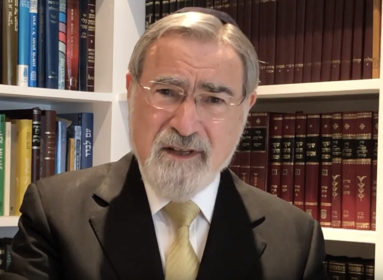By Cindy Mindell
What is the best way to foster young Israel advocates? For the campus-based David Project, the key is not only within the Jewish student community, but also across the wide-ranging landscape that is the modern-day American college. This approach, “relational advocacy,” emphasizes building relationships with diverse communities on campus and helping students to use their Israel experience to relate to their peers.
As winter semester began this year, 67 student leaders returned to their U.S. campuses a little more knowledgeable about Israel, after experiencing The David Project’s “Israel Uncovered: Campus Leaders Mission.” Among them were two Connecticut sophomores – Sarah Kennedy, a Fairfield native at Carnegie Mellon University, and Floridian Josh Feinzig, a student at Yale.
Kennedy began working with The David Project last year as a freshman, when she joined the board of CMU’s Tartans4Israel (T4I). As a T4I member, she helps foster a positive outlook toward Israel on campus through relationship-building with other organizations. A friend and fellow T4I board member went on the first Campus Leaders Mission in 2012 and encouraged Kennedy to apply.
“The possibility of taking a free trip to Israel was enough to pique my interest,” Kennedy says, “but after I found out more about the trip, I knew I had to go. I couldn’t think of a better way to spend my winter break than in Israel, learning about myself as a leader through the context of my home in the Middle East.”
The inaugural trip was launched a year ago with half the number of participants. This year, pro-Israel student advocates from The David Project’s Core Campuses invited key leaders from their respective campuses to join them in seeing and experiencing Israel first-hand. The mission requires that each cohort return to its campus ready to facilitate joint projects and share their Israel experience with peers. The students will work together to open up new channels of conversation about Israel, designed to foster greater understanding of Israel in all its complexity.
Trip participants are involved with all aspects of student life on campuses across the country. Groups represented included College Democrats, College Republicans, student government, gay pride alliances, Latino Student Associations, Black Student Unions, business leadership associations, engineering organizations, campus ministries, feminist and gender centers, several fraternities and sororities, philanthropies, and more. The itinerary was designed so that each leader heard from a speaker or visited a place that he or she connected to on a deep level, says Phillip Brodsky, campus director at The David Project.
Over the course of the 10-day trip, participants met with Ethiopians, Israeli-Arabs, peace activists, film directors, LGBT activists, artists, settlers, musicians, journalists, rabbis, and imams, and visited ancient archeological sites, modern high-tech companies, and holy sites for Jews, Muslims, Christians, and Baha’is. Students visited Tel Aviv, Jerusalem, Haifa, Kfar Kara, Bartaa, the Sea of Galilee, Capernaum, the Western Wall, the Church of the Holy Sepulchre, Hadassah Hospital, Masada, and the Dead Sea.
“We designed the trip so that every student, including the students that are already Israel advocates, walked away having learned more about Israel, Israelis and themselves,” says Brodsky. “There is no one face or facet of Israel that we tried to show on the trip. Instead, we presented Israel as it is: complicated, nuanced, and an amazing place that we love and are excited to share. By showing diverse opinions and visiting different cities in Israel, we showed our students that Israel is a real place, a country of beauty, a country of struggle, and a place that we feel proud of.”
The David Project encouraged participants to invite leaders of non-Jewish campus organizations to join them on the trip.

Visiting Google was particularly exciting for Carnegie Mellon’s student delegation, says Sarah Kennedy. “Erik and I are both studying electrical and computer engineering, Michelle is studying civil and environmental engineering, and David is studying decision science and human-computer interaction with a double minor in both business administration and communication design.” (L to r) Michelle Cousté, Erik Pintar, Sarah Kennedy, David Baboolall.
Sarah Kennedy invited three campus leaders from Carnegie Mellon University: Michelle Cousté, president of Engineers Without Borders; David Baboolall, vice president of Alpha Kappa Psi business fraternity; and Erik Pintar, an active member in the New Life Christian Fellowship and Resident Assistant.
Kennedy received applications from many promising candidates. In the end, the difficult selection process came down to determining which leaders would bring the most diversity to the mission. “After the trip, participants are expected to share what they learned from the experience, so we wanted to create a large network that would enable us to reach out to the most people on campus upon our return,” she says. “The more people we can reach out to, the better.”
Ultimately, says Kennedy, the diversity of trip participants added to the experience.
“Israel Uncovered brought together an inspiring group of young leaders who enabled me to learn more about Israel, leadership, and myself, than any other organized trip in which I’ve participated,” says Kennedy. “Its diverse students created an environment conducive to learning about Israel in a way I had never learned about it before. It was an invaluable experience.”
Josh Feinzig went on the mission with Marc DiPlacido, chairman of The Party of the Right, and Austin Bryniarski, member of Yale College Democrats.
Feinzig, who serves as vice president of Yale Friends of Israel, has traveled to Israel several times, most recently as a summer intern in 2013.
“I felt that I already knew a lot,” he says. “Yet, every person you talk to, every new narrative you hear, reaffirms the understanding that Israel is an incredibly complex place. There’s so much Israel has to offer and so many sides to every conversation and problem. The purpose of the mission is to bring a positive side of Israel back to campus, but the organizers try to show all sides and are honest about the realities of the country. It’s very successful because everybody comes back with the realization that Israel is an incredibly complicated and complex place. At the same time, we enjoyed ourselves and the people. It was an incredibly fun trip.”
Kennedy, who is a graduate of Hillel Academy in Fairfield and Hebrew High School of New England in West Hartford, says, “I spent the majority of my life learning about Israel through a Zionist lens; never before was I given the opportunity to hear from so many diverse speakers like I was on the Israel Uncovered mission. I heard from Israelis, Arab-Israelis, Palestinians, Ethiopians, and settlers, and I visited not only Yad Vashem, the Kotel, Masada, and the Dead Sea, but also Capernaum, the Via Dolorosa, and the Church of the Holy Sepulchre. The diversity of the sites we visited matched the diversity of the leaders who participated in the trip.”
Now back on campus, trip alumni are expected to find ways to share their experiences with their peers. In addition to posting reflections and photos on social media, students are currently writing joint op-eds in their campus newspapers, speaking at their organization’s meetings about their experience, creating public photo-galleries, and planning events to bring together the different communities that each campus’s delegation represented.
At Carnegie Mellon, Kennedy and her fellow mission participants have individually created presentations, led group discussions, and shared what they learned with the respective organizations they belong to. Together, the three are planning a dinner and discussion to be held at the Hillel Jewish University Center of Pittsburgh for various religious and cultural organizations at CMU. “This dinner will be the perfect way to teach people about what we learned over winter break while simultaneously learning from them in a way we might not have had the opportunity to in the past,” Kennedy says.
The three Yale students have continued the conversation they began on the trip, and plan to organize a campus event this semester. Feinzig and Bryniarski hope to work on a research project in Israel this summer.
“I met people with different perspectives and opinions, and learned how other students deal with issues on their campus, and that will inform the way I lead on mine,” says Feinzig. “Ultimately, I left the trip reinvigorated about Israel because, being there with so many people who had never been before gave me a vicarious first Israel experience. It reinvigorated my love for the country and for what it has to offer. It was great on so many different levels – emotional, intellectual, and cultural.”
In fact, most of the students on Kennedy’s bus were first-timers. “I had never been with a group of 32 other leaders all working towards the same goals of understanding the conflict in the Middle East and learning more about leadership in general,” she says. “Through the perspectives of my peers who had never experienced Israel before, through our many discussions about leadership struggles at our universities, current issues in Israel, and possible solutions, and through the intense 10 days we spent together constantly thinking, rethinking, and understanding, I was able to grow stronger in my position as a pro-Israel, American, Jewish college student.”
Comments? email cindym@jewishledger.com.








 Southern New England Jewish Ledger
Southern New England Jewish Ledger









